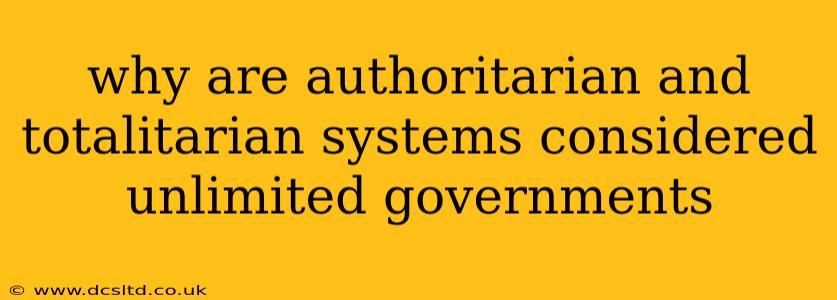Authoritarian and totalitarian regimes are deemed "unlimited governments" because they fundamentally lack the key checks and balances that define limited government. In limited governments, power is distributed and constrained by law, ensuring the protection of individual rights and liberties. Conversely, in unlimited governments, the ruling power faces virtually no constraints, leading to arbitrary rule and the suppression of dissent. This distinction hinges on several crucial factors:
What Defines a Limited Government?
Before understanding why authoritarian and totalitarian systems are considered their antithesis, let's define what constitutes a limited government. A limited government adheres to the rule of law, meaning that even those in power are subject to and accountable under the law. Key characteristics include:
- Constitutionalism: A formal document or set of established principles outlining the government's powers and limitations. This ensures that power isn't concentrated in the hands of a single entity.
- Separation of Powers: The division of governmental power among different branches (legislative, executive, judicial) to prevent tyranny. Each branch acts as a check on the others.
- Independent Judiciary: An unbiased court system to interpret laws and ensure their fair application, preventing arbitrary enforcement.
- Protection of Individual Rights: Guarantees of fundamental rights and freedoms (speech, assembly, religion, due process) are enshrined in law and protected from government intrusion.
- Accountability and Transparency: Mechanisms are in place for holding the government accountable to the people, often through elections, independent media, and a free press.
How Authoritarian and Totalitarian Systems Differ from Limited Governments
Authoritarian and totalitarian systems deviate sharply from these principles, effectively creating unlimited government:
Authoritarian Regimes:
- Concentrated Power: Power is heavily concentrated in the hands of a single person or a small elite group, often without any real accountability.
- Limited Political Participation: While some elections might occur, they often lack genuine competition or are rigged to maintain the ruling party's grip on power. Citizens have limited influence on political decisions.
- Restriction of Rights: While some personal freedoms might be allowed, basic rights are often curtailed, particularly those that challenge the ruling power. Freedom of speech, press, and assembly are frequently suppressed.
- Lack of Checks and Balances: There's little to no effective mechanism to constrain the actions of the ruling power. The judiciary might be subservient to the executive branch, and the legislature might be merely a rubber stamp.
Totalitarian Regimes:
Totalitarian systems represent an even more extreme form of unlimited government, characterized by:
- Complete Control: The state seeks to control all aspects of public and private life, including the economy, education, media, and even personal relationships.
- Suppression of Opposition: Any opposition is brutally suppressed through secret police, propaganda, and widespread surveillance. Individual freedoms are systematically eliminated.
- Cult of Personality: Often, a charismatic leader is glorified and presented as infallible, fostering unquestioning loyalty and obedience.
- Ideological Control: A dominant ideology, often enforced through indoctrination and censorship, dictates all aspects of society.
Why "Unlimited"?
Both authoritarian and totalitarian systems are considered unlimited because they operate without meaningful constraints on the power wielded by the ruling authority. The absence of checks and balances, the suppression of dissent, and the lack of accountability fundamentally distinguish them from limited governments where power is deliberately circumscribed to protect individual rights and freedoms. The ruling power acts with impunity, resulting in an unchecked capacity to influence, control, and even repress its populace.
Frequently Asked Questions
What are some examples of authoritarian regimes?
Many historical and contemporary regimes fit this description, including various dictatorships, single-party states, and military juntas. Specific examples often depend on the criteria used, as the line between authoritarianism and other forms of governance can sometimes be blurry.
How does totalitarianism differ from authoritarianism?
The key difference lies in the extent of state control. Authoritarianism focuses on restricting political participation and suppressing dissent. Totalitarianism goes further, seeking total control over all aspects of life, often through the imposition of a dominant ideology.
Are there any countries today that are considered totalitarian?
Defining a country as strictly "totalitarian" is complex and often debated. However, some states exhibit characteristics that closely align with totalitarian regimes, depending on the specific criteria considered.
In conclusion, the designation of authoritarian and totalitarian systems as "unlimited governments" stems from their fundamental lack of legal restraints on the ruling power, resulting in unchecked authority and the suppression of individual freedoms. The absence of constitutional safeguards and effective mechanisms of accountability solidifies their classification as unlimited.
